Strategic Management Report: Vodafone's Big Data Implementation
VerifiedAdded on 2023/06/03
|13
|4048
|106
Report
AI Summary
This report provides an analytical study of strategy implementation at Vodafone, focusing on the adoption of Big Data. It highlights the challenges Vodafone faces in data management and the strategies employed to overcome them. The report evaluates the implementation of Big Data based on capabilities, systems, leadership models, structure, and people, assessing the success of the implementation and identifying key challenges. It recommends Vodafone to focus on faster implementation and employee education, while learning from other companies' experiences with Big Data. The analysis covers various aspects of strategy implementation, including leadership styles, change management, and the importance of aligning resources with the external and internal environment.
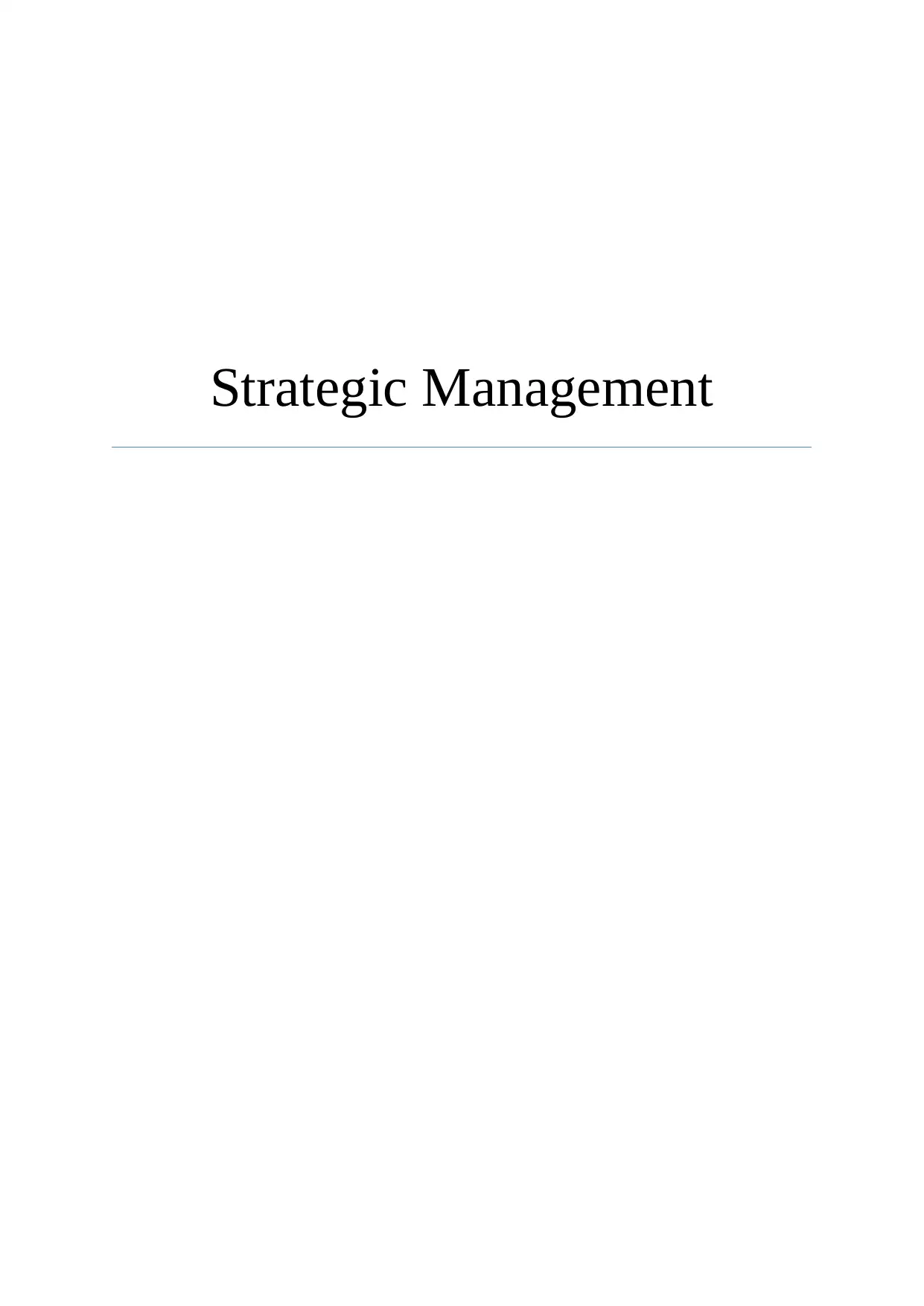
Strategic Management
Paraphrase This Document
Need a fresh take? Get an instant paraphrase of this document with our AI Paraphraser
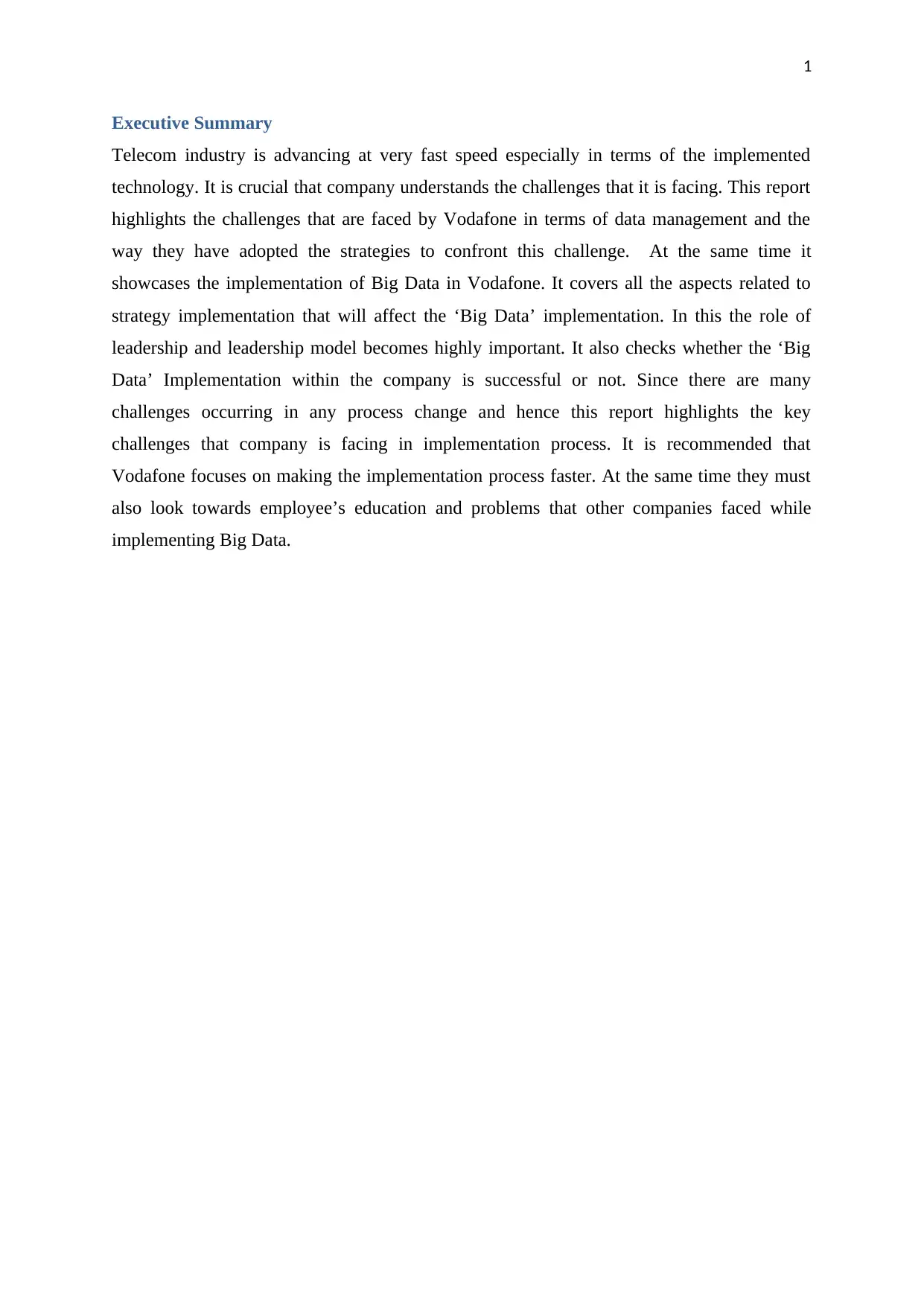
1
Executive Summary
Telecom industry is advancing at very fast speed especially in terms of the implemented
technology. It is crucial that company understands the challenges that it is facing. This report
highlights the challenges that are faced by Vodafone in terms of data management and the
way they have adopted the strategies to confront this challenge. At the same time it
showcases the implementation of Big Data in Vodafone. It covers all the aspects related to
strategy implementation that will affect the ‘Big Data’ implementation. In this the role of
leadership and leadership model becomes highly important. It also checks whether the ‘Big
Data’ Implementation within the company is successful or not. Since there are many
challenges occurring in any process change and hence this report highlights the key
challenges that company is facing in implementation process. It is recommended that
Vodafone focuses on making the implementation process faster. At the same time they must
also look towards employee’s education and problems that other companies faced while
implementing Big Data.
Executive Summary
Telecom industry is advancing at very fast speed especially in terms of the implemented
technology. It is crucial that company understands the challenges that it is facing. This report
highlights the challenges that are faced by Vodafone in terms of data management and the
way they have adopted the strategies to confront this challenge. At the same time it
showcases the implementation of Big Data in Vodafone. It covers all the aspects related to
strategy implementation that will affect the ‘Big Data’ implementation. In this the role of
leadership and leadership model becomes highly important. It also checks whether the ‘Big
Data’ Implementation within the company is successful or not. Since there are many
challenges occurring in any process change and hence this report highlights the key
challenges that company is facing in implementation process. It is recommended that
Vodafone focuses on making the implementation process faster. At the same time they must
also look towards employee’s education and problems that other companies faced while
implementing Big Data.
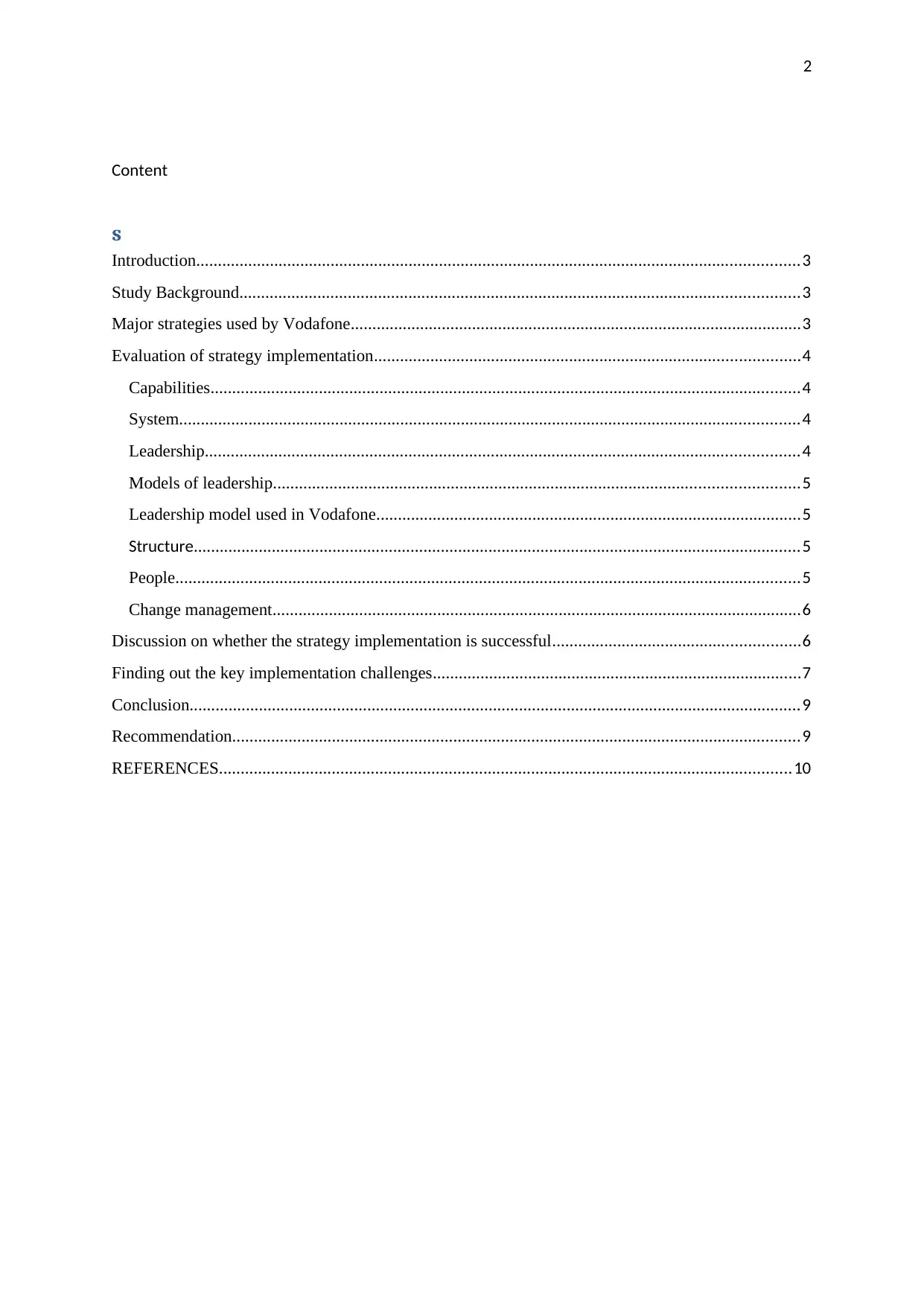
2
Content
s
Introduction...........................................................................................................................................3
Study Background.................................................................................................................................3
Major strategies used by Vodafone........................................................................................................3
Evaluation of strategy implementation..................................................................................................4
Capabilities........................................................................................................................................4
System...............................................................................................................................................4
Leadership.........................................................................................................................................4
Models of leadership.........................................................................................................................5
Leadership model used in Vodafone..................................................................................................5
Structure............................................................................................................................................5
People................................................................................................................................................5
Change management..........................................................................................................................6
Discussion on whether the strategy implementation is successful.........................................................6
Finding out the key implementation challenges.....................................................................................7
Conclusion.............................................................................................................................................9
Recommendation...................................................................................................................................9
REFERENCES....................................................................................................................................10
Content
s
Introduction...........................................................................................................................................3
Study Background.................................................................................................................................3
Major strategies used by Vodafone........................................................................................................3
Evaluation of strategy implementation..................................................................................................4
Capabilities........................................................................................................................................4
System...............................................................................................................................................4
Leadership.........................................................................................................................................4
Models of leadership.........................................................................................................................5
Leadership model used in Vodafone..................................................................................................5
Structure............................................................................................................................................5
People................................................................................................................................................5
Change management..........................................................................................................................6
Discussion on whether the strategy implementation is successful.........................................................6
Finding out the key implementation challenges.....................................................................................7
Conclusion.............................................................................................................................................9
Recommendation...................................................................................................................................9
REFERENCES....................................................................................................................................10
⊘ This is a preview!⊘
Do you want full access?
Subscribe today to unlock all pages.

Trusted by 1+ million students worldwide
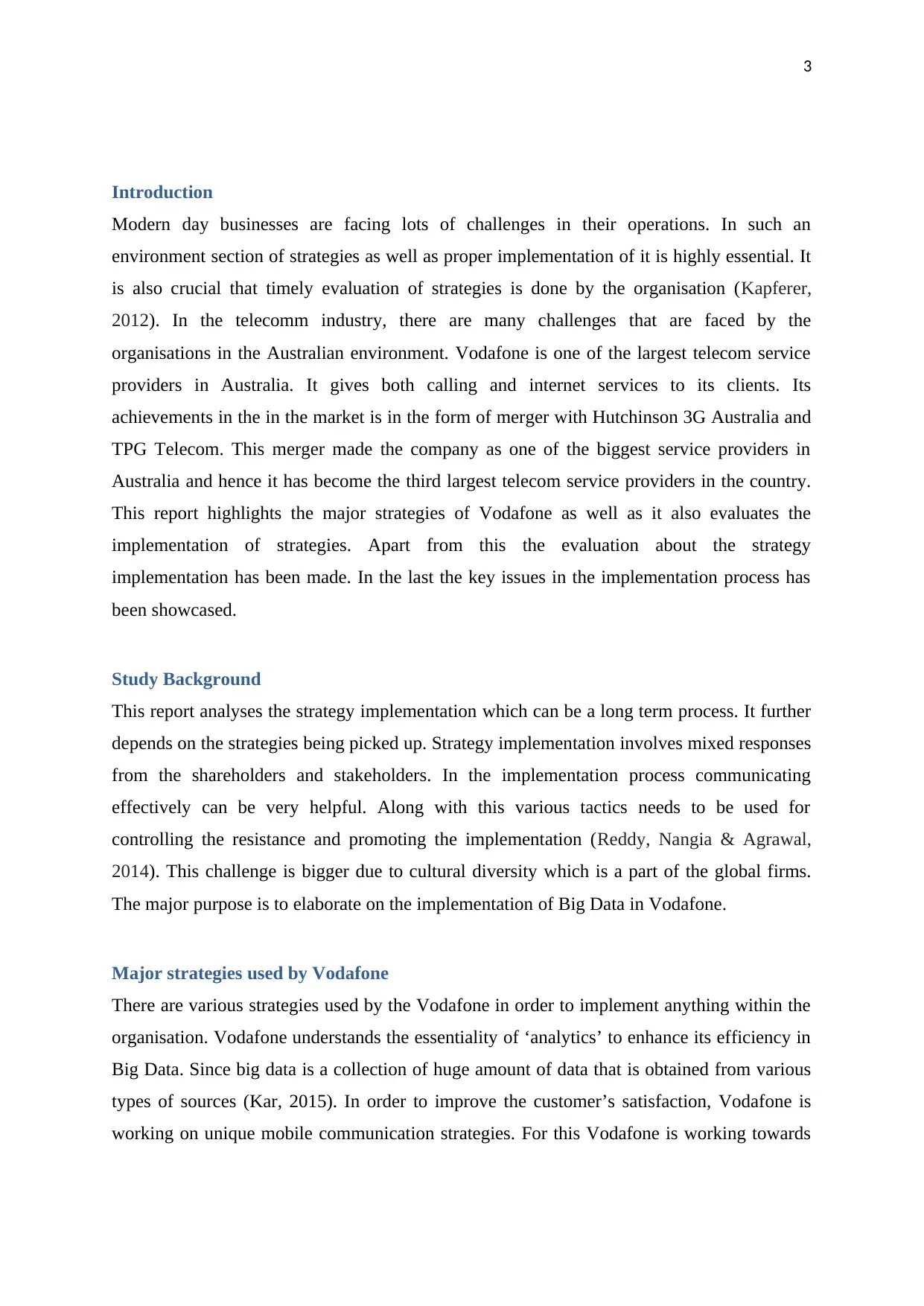
3
Introduction
Modern day businesses are facing lots of challenges in their operations. In such an
environment section of strategies as well as proper implementation of it is highly essential. It
is also crucial that timely evaluation of strategies is done by the organisation (Kapferer,
2012). In the telecomm industry, there are many challenges that are faced by the
organisations in the Australian environment. Vodafone is one of the largest telecom service
providers in Australia. It gives both calling and internet services to its clients. Its
achievements in the in the market is in the form of merger with Hutchinson 3G Australia and
TPG Telecom. This merger made the company as one of the biggest service providers in
Australia and hence it has become the third largest telecom service providers in the country.
This report highlights the major strategies of Vodafone as well as it also evaluates the
implementation of strategies. Apart from this the evaluation about the strategy
implementation has been made. In the last the key issues in the implementation process has
been showcased.
Study Background
This report analyses the strategy implementation which can be a long term process. It further
depends on the strategies being picked up. Strategy implementation involves mixed responses
from the shareholders and stakeholders. In the implementation process communicating
effectively can be very helpful. Along with this various tactics needs to be used for
controlling the resistance and promoting the implementation (Reddy, Nangia & Agrawal,
2014). This challenge is bigger due to cultural diversity which is a part of the global firms.
The major purpose is to elaborate on the implementation of Big Data in Vodafone.
Major strategies used by Vodafone
There are various strategies used by the Vodafone in order to implement anything within the
organisation. Vodafone understands the essentiality of ‘analytics’ to enhance its efficiency in
Big Data. Since big data is a collection of huge amount of data that is obtained from various
types of sources (Kar, 2015). In order to improve the customer’s satisfaction, Vodafone is
working on unique mobile communication strategies. For this Vodafone is working towards
Introduction
Modern day businesses are facing lots of challenges in their operations. In such an
environment section of strategies as well as proper implementation of it is highly essential. It
is also crucial that timely evaluation of strategies is done by the organisation (Kapferer,
2012). In the telecomm industry, there are many challenges that are faced by the
organisations in the Australian environment. Vodafone is one of the largest telecom service
providers in Australia. It gives both calling and internet services to its clients. Its
achievements in the in the market is in the form of merger with Hutchinson 3G Australia and
TPG Telecom. This merger made the company as one of the biggest service providers in
Australia and hence it has become the third largest telecom service providers in the country.
This report highlights the major strategies of Vodafone as well as it also evaluates the
implementation of strategies. Apart from this the evaluation about the strategy
implementation has been made. In the last the key issues in the implementation process has
been showcased.
Study Background
This report analyses the strategy implementation which can be a long term process. It further
depends on the strategies being picked up. Strategy implementation involves mixed responses
from the shareholders and stakeholders. In the implementation process communicating
effectively can be very helpful. Along with this various tactics needs to be used for
controlling the resistance and promoting the implementation (Reddy, Nangia & Agrawal,
2014). This challenge is bigger due to cultural diversity which is a part of the global firms.
The major purpose is to elaborate on the implementation of Big Data in Vodafone.
Major strategies used by Vodafone
There are various strategies used by the Vodafone in order to implement anything within the
organisation. Vodafone understands the essentiality of ‘analytics’ to enhance its efficiency in
Big Data. Since big data is a collection of huge amount of data that is obtained from various
types of sources (Kar, 2015). In order to improve the customer’s satisfaction, Vodafone is
working on unique mobile communication strategies. For this Vodafone is working towards
Paraphrase This Document
Need a fresh take? Get an instant paraphrase of this document with our AI Paraphraser
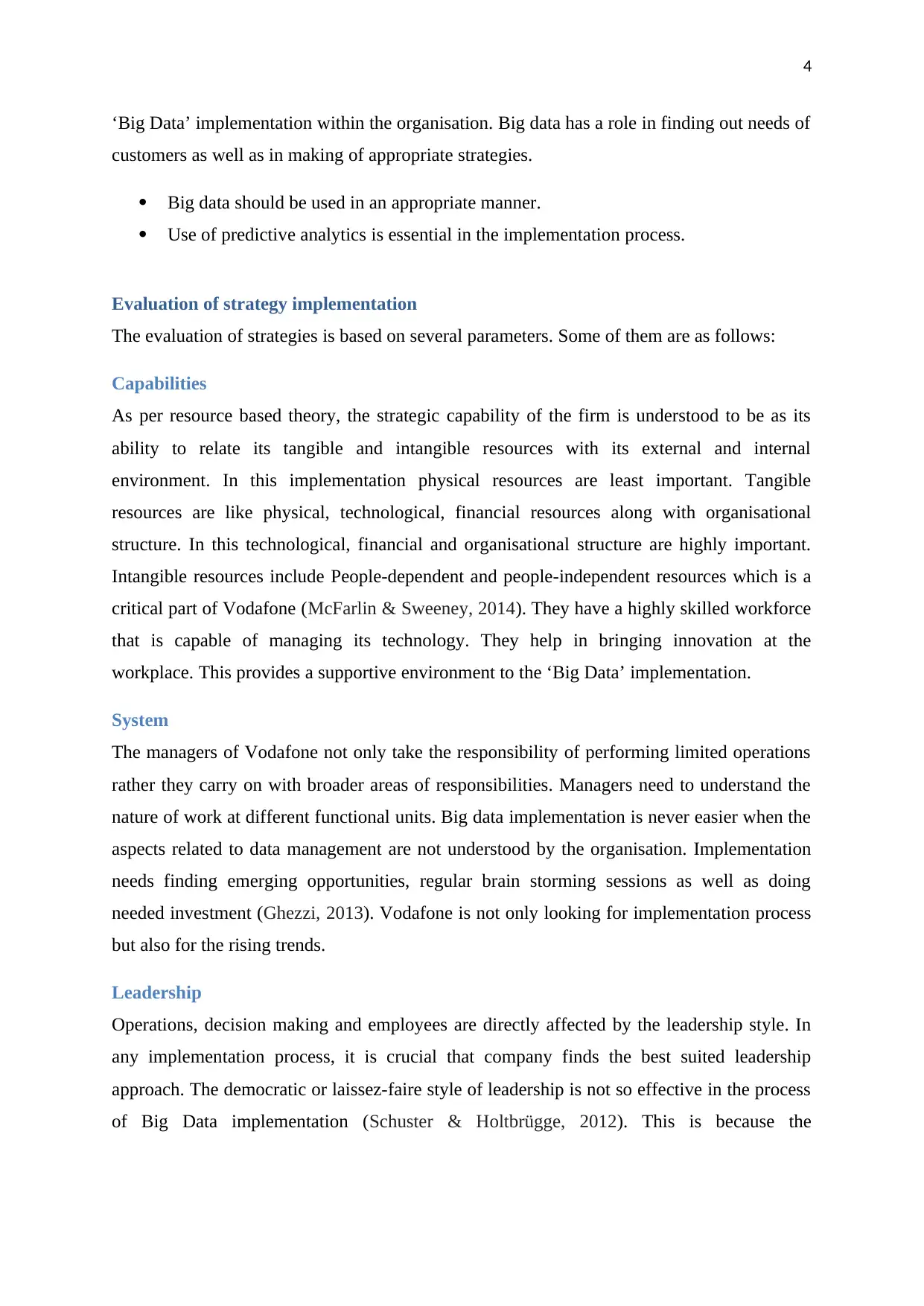
4
‘Big Data’ implementation within the organisation. Big data has a role in finding out needs of
customers as well as in making of appropriate strategies.
Big data should be used in an appropriate manner.
Use of predictive analytics is essential in the implementation process.
Evaluation of strategy implementation
The evaluation of strategies is based on several parameters. Some of them are as follows:
Capabilities
As per resource based theory, the strategic capability of the firm is understood to be as its
ability to relate its tangible and intangible resources with its external and internal
environment. In this implementation physical resources are least important. Tangible
resources are like physical, technological, financial resources along with organisational
structure. In this technological, financial and organisational structure are highly important.
Intangible resources include People-dependent and people-independent resources which is a
critical part of Vodafone (McFarlin & Sweeney, 2014). They have a highly skilled workforce
that is capable of managing its technology. They help in bringing innovation at the
workplace. This provides a supportive environment to the ‘Big Data’ implementation.
System
The managers of Vodafone not only take the responsibility of performing limited operations
rather they carry on with broader areas of responsibilities. Managers need to understand the
nature of work at different functional units. Big data implementation is never easier when the
aspects related to data management are not understood by the organisation. Implementation
needs finding emerging opportunities, regular brain storming sessions as well as doing
needed investment (Ghezzi, 2013). Vodafone is not only looking for implementation process
but also for the rising trends.
Leadership
Operations, decision making and employees are directly affected by the leadership style. In
any implementation process, it is crucial that company finds the best suited leadership
approach. The democratic or laissez-faire style of leadership is not so effective in the process
of Big Data implementation (Schuster & Holtbrügge, 2012). This is because the
‘Big Data’ implementation within the organisation. Big data has a role in finding out needs of
customers as well as in making of appropriate strategies.
Big data should be used in an appropriate manner.
Use of predictive analytics is essential in the implementation process.
Evaluation of strategy implementation
The evaluation of strategies is based on several parameters. Some of them are as follows:
Capabilities
As per resource based theory, the strategic capability of the firm is understood to be as its
ability to relate its tangible and intangible resources with its external and internal
environment. In this implementation physical resources are least important. Tangible
resources are like physical, technological, financial resources along with organisational
structure. In this technological, financial and organisational structure are highly important.
Intangible resources include People-dependent and people-independent resources which is a
critical part of Vodafone (McFarlin & Sweeney, 2014). They have a highly skilled workforce
that is capable of managing its technology. They help in bringing innovation at the
workplace. This provides a supportive environment to the ‘Big Data’ implementation.
System
The managers of Vodafone not only take the responsibility of performing limited operations
rather they carry on with broader areas of responsibilities. Managers need to understand the
nature of work at different functional units. Big data implementation is never easier when the
aspects related to data management are not understood by the organisation. Implementation
needs finding emerging opportunities, regular brain storming sessions as well as doing
needed investment (Ghezzi, 2013). Vodafone is not only looking for implementation process
but also for the rising trends.
Leadership
Operations, decision making and employees are directly affected by the leadership style. In
any implementation process, it is crucial that company finds the best suited leadership
approach. The democratic or laissez-faire style of leadership is not so effective in the process
of Big Data implementation (Schuster & Holtbrügge, 2012). This is because the
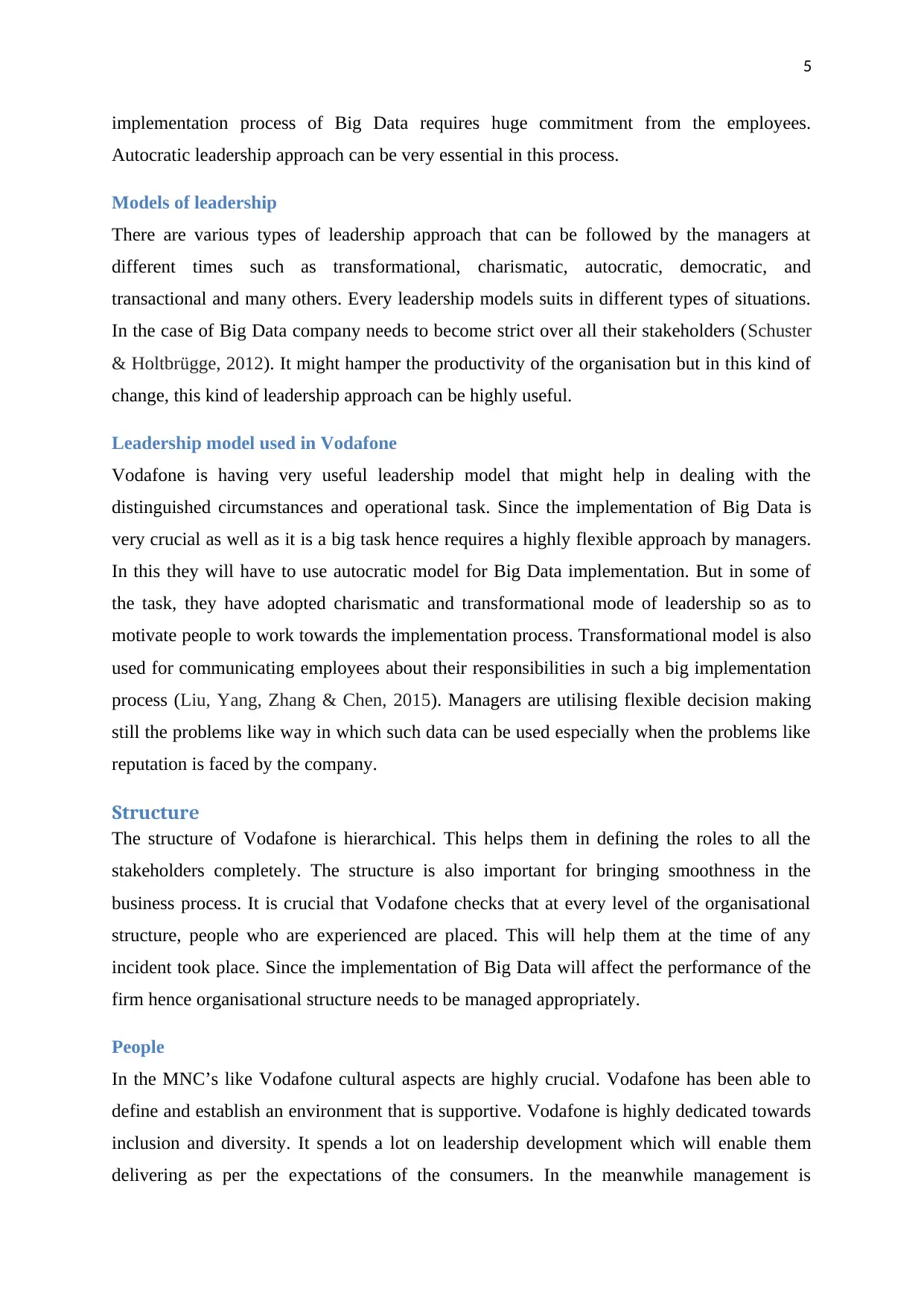
5
implementation process of Big Data requires huge commitment from the employees.
Autocratic leadership approach can be very essential in this process.
Models of leadership
There are various types of leadership approach that can be followed by the managers at
different times such as transformational, charismatic, autocratic, democratic, and
transactional and many others. Every leadership models suits in different types of situations.
In the case of Big Data company needs to become strict over all their stakeholders (Schuster
& Holtbrügge, 2012). It might hamper the productivity of the organisation but in this kind of
change, this kind of leadership approach can be highly useful.
Leadership model used in Vodafone
Vodafone is having very useful leadership model that might help in dealing with the
distinguished circumstances and operational task. Since the implementation of Big Data is
very crucial as well as it is a big task hence requires a highly flexible approach by managers.
In this they will have to use autocratic model for Big Data implementation. But in some of
the task, they have adopted charismatic and transformational mode of leadership so as to
motivate people to work towards the implementation process. Transformational model is also
used for communicating employees about their responsibilities in such a big implementation
process (Liu, Yang, Zhang & Chen, 2015). Managers are utilising flexible decision making
still the problems like way in which such data can be used especially when the problems like
reputation is faced by the company.
Structure
The structure of Vodafone is hierarchical. This helps them in defining the roles to all the
stakeholders completely. The structure is also important for bringing smoothness in the
business process. It is crucial that Vodafone checks that at every level of the organisational
structure, people who are experienced are placed. This will help them at the time of any
incident took place. Since the implementation of Big Data will affect the performance of the
firm hence organisational structure needs to be managed appropriately.
People
In the MNC’s like Vodafone cultural aspects are highly crucial. Vodafone has been able to
define and establish an environment that is supportive. Vodafone is highly dedicated towards
inclusion and diversity. It spends a lot on leadership development which will enable them
delivering as per the expectations of the consumers. In the meanwhile management is
implementation process of Big Data requires huge commitment from the employees.
Autocratic leadership approach can be very essential in this process.
Models of leadership
There are various types of leadership approach that can be followed by the managers at
different times such as transformational, charismatic, autocratic, democratic, and
transactional and many others. Every leadership models suits in different types of situations.
In the case of Big Data company needs to become strict over all their stakeholders (Schuster
& Holtbrügge, 2012). It might hamper the productivity of the organisation but in this kind of
change, this kind of leadership approach can be highly useful.
Leadership model used in Vodafone
Vodafone is having very useful leadership model that might help in dealing with the
distinguished circumstances and operational task. Since the implementation of Big Data is
very crucial as well as it is a big task hence requires a highly flexible approach by managers.
In this they will have to use autocratic model for Big Data implementation. But in some of
the task, they have adopted charismatic and transformational mode of leadership so as to
motivate people to work towards the implementation process. Transformational model is also
used for communicating employees about their responsibilities in such a big implementation
process (Liu, Yang, Zhang & Chen, 2015). Managers are utilising flexible decision making
still the problems like way in which such data can be used especially when the problems like
reputation is faced by the company.
Structure
The structure of Vodafone is hierarchical. This helps them in defining the roles to all the
stakeholders completely. The structure is also important for bringing smoothness in the
business process. It is crucial that Vodafone checks that at every level of the organisational
structure, people who are experienced are placed. This will help them at the time of any
incident took place. Since the implementation of Big Data will affect the performance of the
firm hence organisational structure needs to be managed appropriately.
People
In the MNC’s like Vodafone cultural aspects are highly crucial. Vodafone has been able to
define and establish an environment that is supportive. Vodafone is highly dedicated towards
inclusion and diversity. It spends a lot on leadership development which will enable them
delivering as per the expectations of the consumers. In the meanwhile management is
⊘ This is a preview!⊘
Do you want full access?
Subscribe today to unlock all pages.

Trusted by 1+ million students worldwide
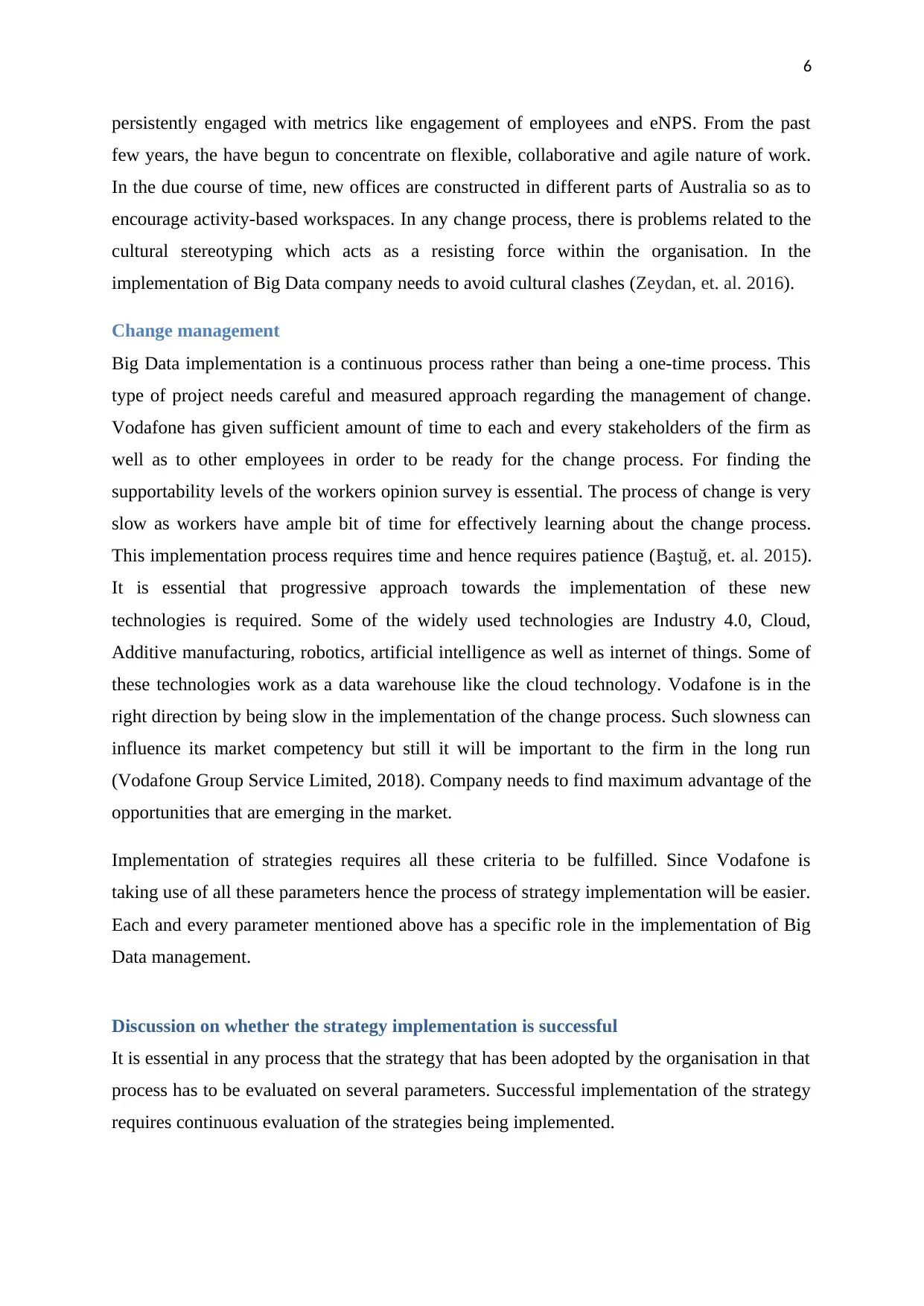
6
persistently engaged with metrics like engagement of employees and eNPS. From the past
few years, the have begun to concentrate on flexible, collaborative and agile nature of work.
In the due course of time, new offices are constructed in different parts of Australia so as to
encourage activity-based workspaces. In any change process, there is problems related to the
cultural stereotyping which acts as a resisting force within the organisation. In the
implementation of Big Data company needs to avoid cultural clashes (Zeydan, et. al. 2016).
Change management
Big Data implementation is a continuous process rather than being a one-time process. This
type of project needs careful and measured approach regarding the management of change.
Vodafone has given sufficient amount of time to each and every stakeholders of the firm as
well as to other employees in order to be ready for the change process. For finding the
supportability levels of the workers opinion survey is essential. The process of change is very
slow as workers have ample bit of time for effectively learning about the change process.
This implementation process requires time and hence requires patience (Baştuğ, et. al. 2015).
It is essential that progressive approach towards the implementation of these new
technologies is required. Some of the widely used technologies are Industry 4.0, Cloud,
Additive manufacturing, robotics, artificial intelligence as well as internet of things. Some of
these technologies work as a data warehouse like the cloud technology. Vodafone is in the
right direction by being slow in the implementation of the change process. Such slowness can
influence its market competency but still it will be important to the firm in the long run
(Vodafone Group Service Limited, 2018). Company needs to find maximum advantage of the
opportunities that are emerging in the market.
Implementation of strategies requires all these criteria to be fulfilled. Since Vodafone is
taking use of all these parameters hence the process of strategy implementation will be easier.
Each and every parameter mentioned above has a specific role in the implementation of Big
Data management.
Discussion on whether the strategy implementation is successful
It is essential in any process that the strategy that has been adopted by the organisation in that
process has to be evaluated on several parameters. Successful implementation of the strategy
requires continuous evaluation of the strategies being implemented.
persistently engaged with metrics like engagement of employees and eNPS. From the past
few years, the have begun to concentrate on flexible, collaborative and agile nature of work.
In the due course of time, new offices are constructed in different parts of Australia so as to
encourage activity-based workspaces. In any change process, there is problems related to the
cultural stereotyping which acts as a resisting force within the organisation. In the
implementation of Big Data company needs to avoid cultural clashes (Zeydan, et. al. 2016).
Change management
Big Data implementation is a continuous process rather than being a one-time process. This
type of project needs careful and measured approach regarding the management of change.
Vodafone has given sufficient amount of time to each and every stakeholders of the firm as
well as to other employees in order to be ready for the change process. For finding the
supportability levels of the workers opinion survey is essential. The process of change is very
slow as workers have ample bit of time for effectively learning about the change process.
This implementation process requires time and hence requires patience (Baştuğ, et. al. 2015).
It is essential that progressive approach towards the implementation of these new
technologies is required. Some of the widely used technologies are Industry 4.0, Cloud,
Additive manufacturing, robotics, artificial intelligence as well as internet of things. Some of
these technologies work as a data warehouse like the cloud technology. Vodafone is in the
right direction by being slow in the implementation of the change process. Such slowness can
influence its market competency but still it will be important to the firm in the long run
(Vodafone Group Service Limited, 2018). Company needs to find maximum advantage of the
opportunities that are emerging in the market.
Implementation of strategies requires all these criteria to be fulfilled. Since Vodafone is
taking use of all these parameters hence the process of strategy implementation will be easier.
Each and every parameter mentioned above has a specific role in the implementation of Big
Data management.
Discussion on whether the strategy implementation is successful
It is essential in any process that the strategy that has been adopted by the organisation in that
process has to be evaluated on several parameters. Successful implementation of the strategy
requires continuous evaluation of the strategies being implemented.
Paraphrase This Document
Need a fresh take? Get an instant paraphrase of this document with our AI Paraphraser
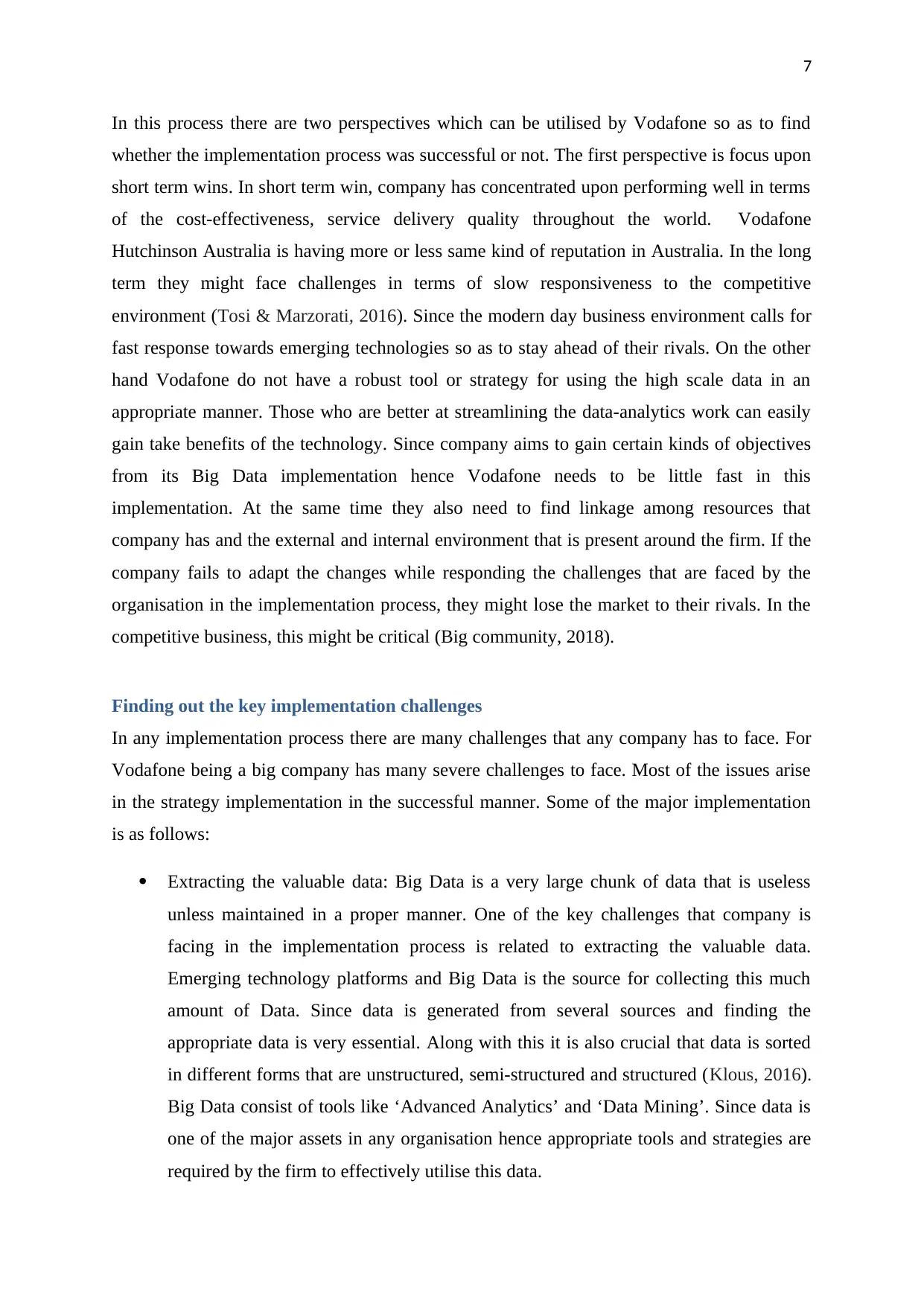
7
In this process there are two perspectives which can be utilised by Vodafone so as to find
whether the implementation process was successful or not. The first perspective is focus upon
short term wins. In short term win, company has concentrated upon performing well in terms
of the cost-effectiveness, service delivery quality throughout the world. Vodafone
Hutchinson Australia is having more or less same kind of reputation in Australia. In the long
term they might face challenges in terms of slow responsiveness to the competitive
environment (Tosi & Marzorati, 2016). Since the modern day business environment calls for
fast response towards emerging technologies so as to stay ahead of their rivals. On the other
hand Vodafone do not have a robust tool or strategy for using the high scale data in an
appropriate manner. Those who are better at streamlining the data-analytics work can easily
gain take benefits of the technology. Since company aims to gain certain kinds of objectives
from its Big Data implementation hence Vodafone needs to be little fast in this
implementation. At the same time they also need to find linkage among resources that
company has and the external and internal environment that is present around the firm. If the
company fails to adapt the changes while responding the challenges that are faced by the
organisation in the implementation process, they might lose the market to their rivals. In the
competitive business, this might be critical (Big community, 2018).
Finding out the key implementation challenges
In any implementation process there are many challenges that any company has to face. For
Vodafone being a big company has many severe challenges to face. Most of the issues arise
in the strategy implementation in the successful manner. Some of the major implementation
is as follows:
Extracting the valuable data: Big Data is a very large chunk of data that is useless
unless maintained in a proper manner. One of the key challenges that company is
facing in the implementation process is related to extracting the valuable data.
Emerging technology platforms and Big Data is the source for collecting this much
amount of Data. Since data is generated from several sources and finding the
appropriate data is very essential. Along with this it is also crucial that data is sorted
in different forms that are unstructured, semi-structured and structured (Klous, 2016).
Big Data consist of tools like ‘Advanced Analytics’ and ‘Data Mining’. Since data is
one of the major assets in any organisation hence appropriate tools and strategies are
required by the firm to effectively utilise this data.
In this process there are two perspectives which can be utilised by Vodafone so as to find
whether the implementation process was successful or not. The first perspective is focus upon
short term wins. In short term win, company has concentrated upon performing well in terms
of the cost-effectiveness, service delivery quality throughout the world. Vodafone
Hutchinson Australia is having more or less same kind of reputation in Australia. In the long
term they might face challenges in terms of slow responsiveness to the competitive
environment (Tosi & Marzorati, 2016). Since the modern day business environment calls for
fast response towards emerging technologies so as to stay ahead of their rivals. On the other
hand Vodafone do not have a robust tool or strategy for using the high scale data in an
appropriate manner. Those who are better at streamlining the data-analytics work can easily
gain take benefits of the technology. Since company aims to gain certain kinds of objectives
from its Big Data implementation hence Vodafone needs to be little fast in this
implementation. At the same time they also need to find linkage among resources that
company has and the external and internal environment that is present around the firm. If the
company fails to adapt the changes while responding the challenges that are faced by the
organisation in the implementation process, they might lose the market to their rivals. In the
competitive business, this might be critical (Big community, 2018).
Finding out the key implementation challenges
In any implementation process there are many challenges that any company has to face. For
Vodafone being a big company has many severe challenges to face. Most of the issues arise
in the strategy implementation in the successful manner. Some of the major implementation
is as follows:
Extracting the valuable data: Big Data is a very large chunk of data that is useless
unless maintained in a proper manner. One of the key challenges that company is
facing in the implementation process is related to extracting the valuable data.
Emerging technology platforms and Big Data is the source for collecting this much
amount of Data. Since data is generated from several sources and finding the
appropriate data is very essential. Along with this it is also crucial that data is sorted
in different forms that are unstructured, semi-structured and structured (Klous, 2016).
Big Data consist of tools like ‘Advanced Analytics’ and ‘Data Mining’. Since data is
one of the major assets in any organisation hence appropriate tools and strategies are
required by the firm to effectively utilise this data.
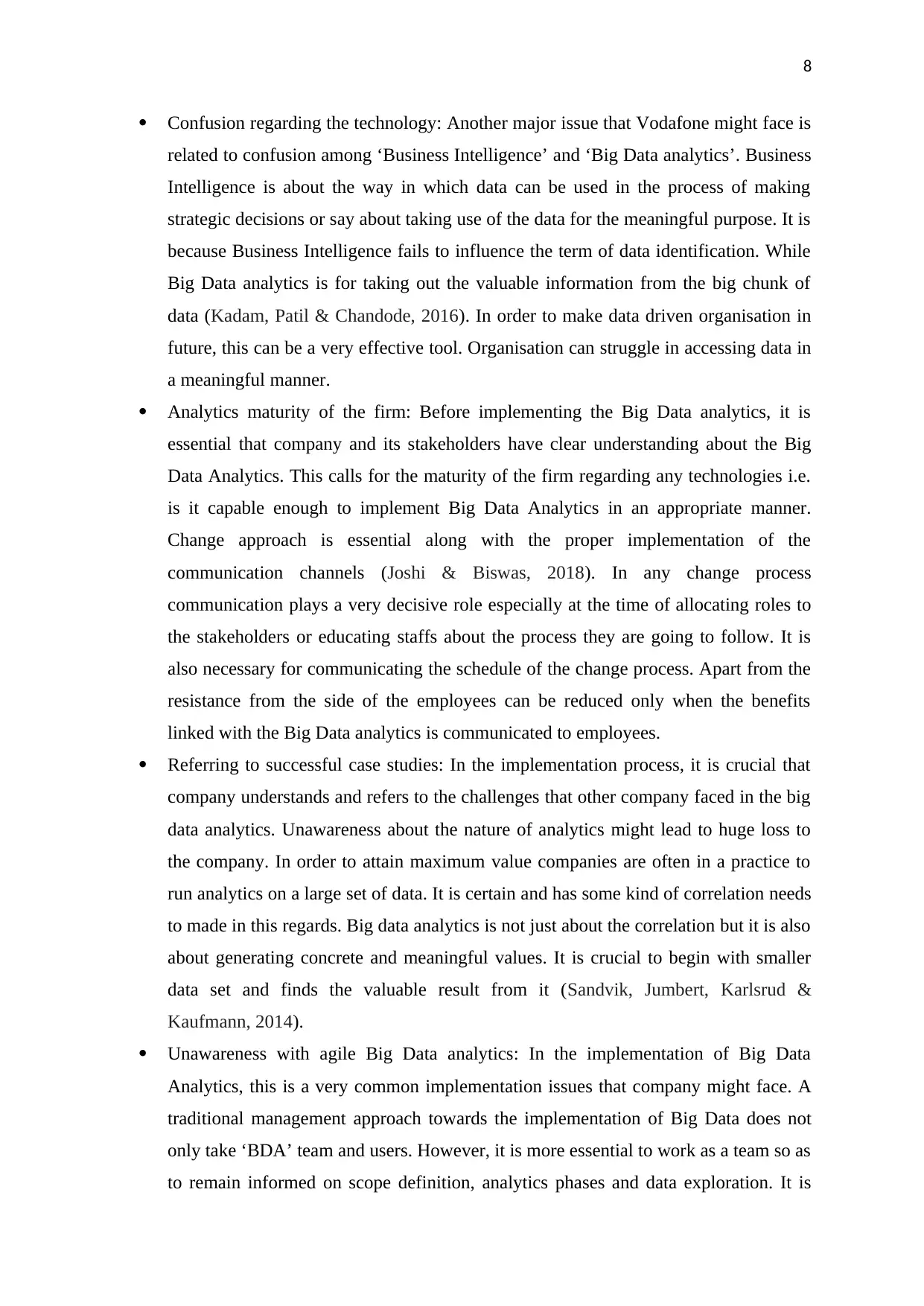
8
Confusion regarding the technology: Another major issue that Vodafone might face is
related to confusion among ‘Business Intelligence’ and ‘Big Data analytics’. Business
Intelligence is about the way in which data can be used in the process of making
strategic decisions or say about taking use of the data for the meaningful purpose. It is
because Business Intelligence fails to influence the term of data identification. While
Big Data analytics is for taking out the valuable information from the big chunk of
data (Kadam, Patil & Chandode, 2016). In order to make data driven organisation in
future, this can be a very effective tool. Organisation can struggle in accessing data in
a meaningful manner.
Analytics maturity of the firm: Before implementing the Big Data analytics, it is
essential that company and its stakeholders have clear understanding about the Big
Data Analytics. This calls for the maturity of the firm regarding any technologies i.e.
is it capable enough to implement Big Data Analytics in an appropriate manner.
Change approach is essential along with the proper implementation of the
communication channels (Joshi & Biswas, 2018). In any change process
communication plays a very decisive role especially at the time of allocating roles to
the stakeholders or educating staffs about the process they are going to follow. It is
also necessary for communicating the schedule of the change process. Apart from the
resistance from the side of the employees can be reduced only when the benefits
linked with the Big Data analytics is communicated to employees.
Referring to successful case studies: In the implementation process, it is crucial that
company understands and refers to the challenges that other company faced in the big
data analytics. Unawareness about the nature of analytics might lead to huge loss to
the company. In order to attain maximum value companies are often in a practice to
run analytics on a large set of data. It is certain and has some kind of correlation needs
to made in this regards. Big data analytics is not just about the correlation but it is also
about generating concrete and meaningful values. It is crucial to begin with smaller
data set and finds the valuable result from it (Sandvik, Jumbert, Karlsrud &
Kaufmann, 2014).
Unawareness with agile Big Data analytics: In the implementation of Big Data
Analytics, this is a very common implementation issues that company might face. A
traditional management approach towards the implementation of Big Data does not
only take ‘BDA’ team and users. However, it is more essential to work as a team so as
to remain informed on scope definition, analytics phases and data exploration. It is
Confusion regarding the technology: Another major issue that Vodafone might face is
related to confusion among ‘Business Intelligence’ and ‘Big Data analytics’. Business
Intelligence is about the way in which data can be used in the process of making
strategic decisions or say about taking use of the data for the meaningful purpose. It is
because Business Intelligence fails to influence the term of data identification. While
Big Data analytics is for taking out the valuable information from the big chunk of
data (Kadam, Patil & Chandode, 2016). In order to make data driven organisation in
future, this can be a very effective tool. Organisation can struggle in accessing data in
a meaningful manner.
Analytics maturity of the firm: Before implementing the Big Data analytics, it is
essential that company and its stakeholders have clear understanding about the Big
Data Analytics. This calls for the maturity of the firm regarding any technologies i.e.
is it capable enough to implement Big Data Analytics in an appropriate manner.
Change approach is essential along with the proper implementation of the
communication channels (Joshi & Biswas, 2018). In any change process
communication plays a very decisive role especially at the time of allocating roles to
the stakeholders or educating staffs about the process they are going to follow. It is
also necessary for communicating the schedule of the change process. Apart from the
resistance from the side of the employees can be reduced only when the benefits
linked with the Big Data analytics is communicated to employees.
Referring to successful case studies: In the implementation process, it is crucial that
company understands and refers to the challenges that other company faced in the big
data analytics. Unawareness about the nature of analytics might lead to huge loss to
the company. In order to attain maximum value companies are often in a practice to
run analytics on a large set of data. It is certain and has some kind of correlation needs
to made in this regards. Big data analytics is not just about the correlation but it is also
about generating concrete and meaningful values. It is crucial to begin with smaller
data set and finds the valuable result from it (Sandvik, Jumbert, Karlsrud &
Kaufmann, 2014).
Unawareness with agile Big Data analytics: In the implementation of Big Data
Analytics, this is a very common implementation issues that company might face. A
traditional management approach towards the implementation of Big Data does not
only take ‘BDA’ team and users. However, it is more essential to work as a team so as
to remain informed on scope definition, analytics phases and data exploration. It is
⊘ This is a preview!⊘
Do you want full access?
Subscribe today to unlock all pages.

Trusted by 1+ million students worldwide
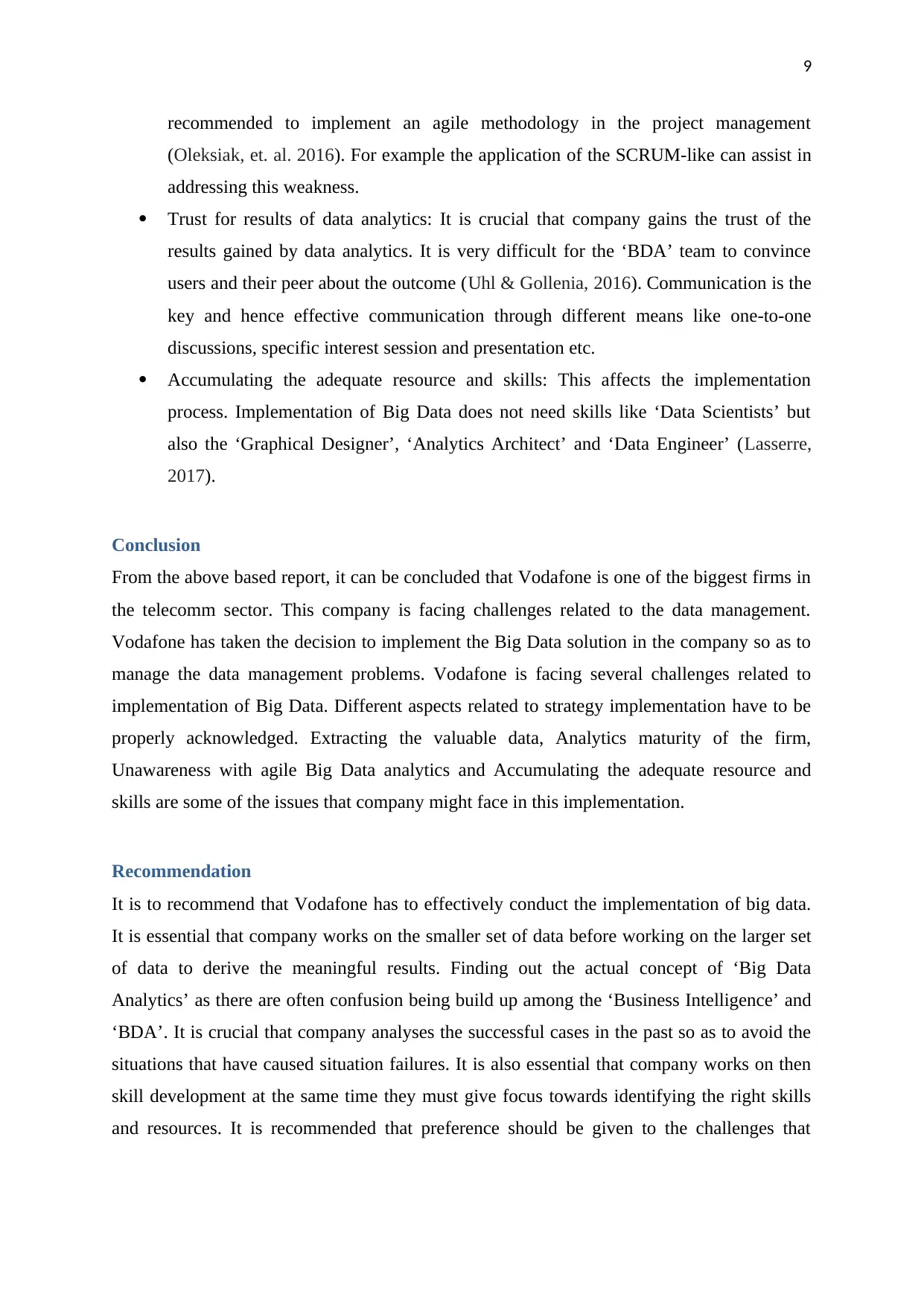
9
recommended to implement an agile methodology in the project management
(Oleksiak, et. al. 2016). For example the application of the SCRUM-like can assist in
addressing this weakness.
Trust for results of data analytics: It is crucial that company gains the trust of the
results gained by data analytics. It is very difficult for the ‘BDA’ team to convince
users and their peer about the outcome (Uhl & Gollenia, 2016). Communication is the
key and hence effective communication through different means like one-to-one
discussions, specific interest session and presentation etc.
Accumulating the adequate resource and skills: This affects the implementation
process. Implementation of Big Data does not need skills like ‘Data Scientists’ but
also the ‘Graphical Designer’, ‘Analytics Architect’ and ‘Data Engineer’ (Lasserre,
2017).
Conclusion
From the above based report, it can be concluded that Vodafone is one of the biggest firms in
the telecomm sector. This company is facing challenges related to the data management.
Vodafone has taken the decision to implement the Big Data solution in the company so as to
manage the data management problems. Vodafone is facing several challenges related to
implementation of Big Data. Different aspects related to strategy implementation have to be
properly acknowledged. Extracting the valuable data, Analytics maturity of the firm,
Unawareness with agile Big Data analytics and Accumulating the adequate resource and
skills are some of the issues that company might face in this implementation.
Recommendation
It is to recommend that Vodafone has to effectively conduct the implementation of big data.
It is essential that company works on the smaller set of data before working on the larger set
of data to derive the meaningful results. Finding out the actual concept of ‘Big Data
Analytics’ as there are often confusion being build up among the ‘Business Intelligence’ and
‘BDA’. It is crucial that company analyses the successful cases in the past so as to avoid the
situations that have caused situation failures. It is also essential that company works on then
skill development at the same time they must give focus towards identifying the right skills
and resources. It is recommended that preference should be given to the challenges that
recommended to implement an agile methodology in the project management
(Oleksiak, et. al. 2016). For example the application of the SCRUM-like can assist in
addressing this weakness.
Trust for results of data analytics: It is crucial that company gains the trust of the
results gained by data analytics. It is very difficult for the ‘BDA’ team to convince
users and their peer about the outcome (Uhl & Gollenia, 2016). Communication is the
key and hence effective communication through different means like one-to-one
discussions, specific interest session and presentation etc.
Accumulating the adequate resource and skills: This affects the implementation
process. Implementation of Big Data does not need skills like ‘Data Scientists’ but
also the ‘Graphical Designer’, ‘Analytics Architect’ and ‘Data Engineer’ (Lasserre,
2017).
Conclusion
From the above based report, it can be concluded that Vodafone is one of the biggest firms in
the telecomm sector. This company is facing challenges related to the data management.
Vodafone has taken the decision to implement the Big Data solution in the company so as to
manage the data management problems. Vodafone is facing several challenges related to
implementation of Big Data. Different aspects related to strategy implementation have to be
properly acknowledged. Extracting the valuable data, Analytics maturity of the firm,
Unawareness with agile Big Data analytics and Accumulating the adequate resource and
skills are some of the issues that company might face in this implementation.
Recommendation
It is to recommend that Vodafone has to effectively conduct the implementation of big data.
It is essential that company works on the smaller set of data before working on the larger set
of data to derive the meaningful results. Finding out the actual concept of ‘Big Data
Analytics’ as there are often confusion being build up among the ‘Business Intelligence’ and
‘BDA’. It is crucial that company analyses the successful cases in the past so as to avoid the
situations that have caused situation failures. It is also essential that company works on then
skill development at the same time they must give focus towards identifying the right skills
and resources. It is recommended that preference should be given to the challenges that
Paraphrase This Document
Need a fresh take? Get an instant paraphrase of this document with our AI Paraphraser
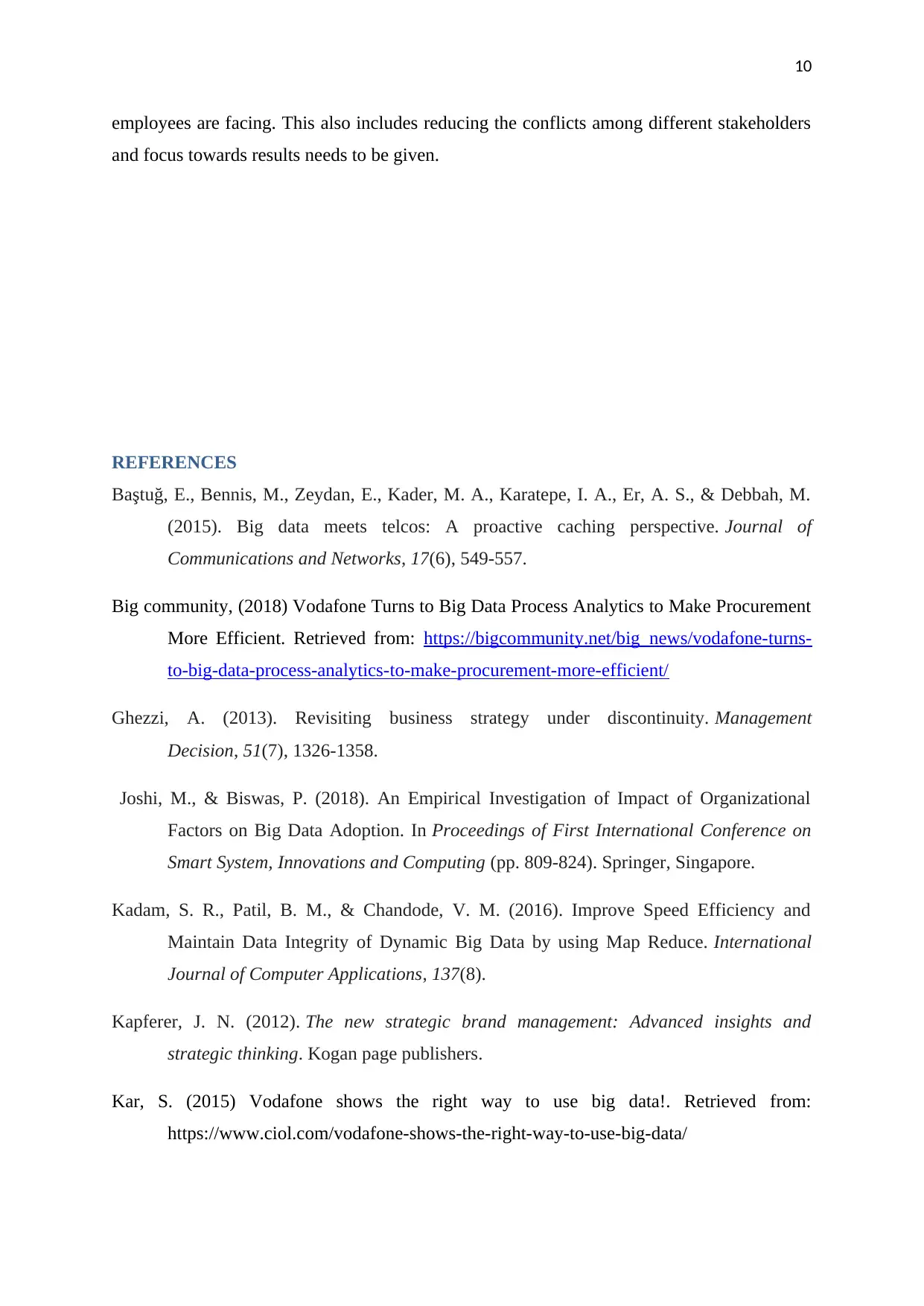
10
employees are facing. This also includes reducing the conflicts among different stakeholders
and focus towards results needs to be given.
REFERENCES
Baştuğ, E., Bennis, M., Zeydan, E., Kader, M. A., Karatepe, I. A., Er, A. S., & Debbah, M.
(2015). Big data meets telcos: A proactive caching perspective. Journal of
Communications and Networks, 17(6), 549-557.
Big community, (2018) Vodafone Turns to Big Data Process Analytics to Make Procurement
More Efficient. Retrieved from: https://bigcommunity.net/big_news/vodafone-turns-
to-big-data-process-analytics-to-make-procurement-more-efficient/
Ghezzi, A. (2013). Revisiting business strategy under discontinuity. Management
Decision, 51(7), 1326-1358.
Joshi, M., & Biswas, P. (2018). An Empirical Investigation of Impact of Organizational
Factors on Big Data Adoption. In Proceedings of First International Conference on
Smart System, Innovations and Computing (pp. 809-824). Springer, Singapore.
Kadam, S. R., Patil, B. M., & Chandode, V. M. (2016). Improve Speed Efficiency and
Maintain Data Integrity of Dynamic Big Data by using Map Reduce. International
Journal of Computer Applications, 137(8).
Kapferer, J. N. (2012). The new strategic brand management: Advanced insights and
strategic thinking. Kogan page publishers.
Kar, S. (2015) Vodafone shows the right way to use big data!. Retrieved from:
https://www.ciol.com/vodafone-shows-the-right-way-to-use-big-data/
employees are facing. This also includes reducing the conflicts among different stakeholders
and focus towards results needs to be given.
REFERENCES
Baştuğ, E., Bennis, M., Zeydan, E., Kader, M. A., Karatepe, I. A., Er, A. S., & Debbah, M.
(2015). Big data meets telcos: A proactive caching perspective. Journal of
Communications and Networks, 17(6), 549-557.
Big community, (2018) Vodafone Turns to Big Data Process Analytics to Make Procurement
More Efficient. Retrieved from: https://bigcommunity.net/big_news/vodafone-turns-
to-big-data-process-analytics-to-make-procurement-more-efficient/
Ghezzi, A. (2013). Revisiting business strategy under discontinuity. Management
Decision, 51(7), 1326-1358.
Joshi, M., & Biswas, P. (2018). An Empirical Investigation of Impact of Organizational
Factors on Big Data Adoption. In Proceedings of First International Conference on
Smart System, Innovations and Computing (pp. 809-824). Springer, Singapore.
Kadam, S. R., Patil, B. M., & Chandode, V. M. (2016). Improve Speed Efficiency and
Maintain Data Integrity of Dynamic Big Data by using Map Reduce. International
Journal of Computer Applications, 137(8).
Kapferer, J. N. (2012). The new strategic brand management: Advanced insights and
strategic thinking. Kogan page publishers.
Kar, S. (2015) Vodafone shows the right way to use big data!. Retrieved from:
https://www.ciol.com/vodafone-shows-the-right-way-to-use-big-data/
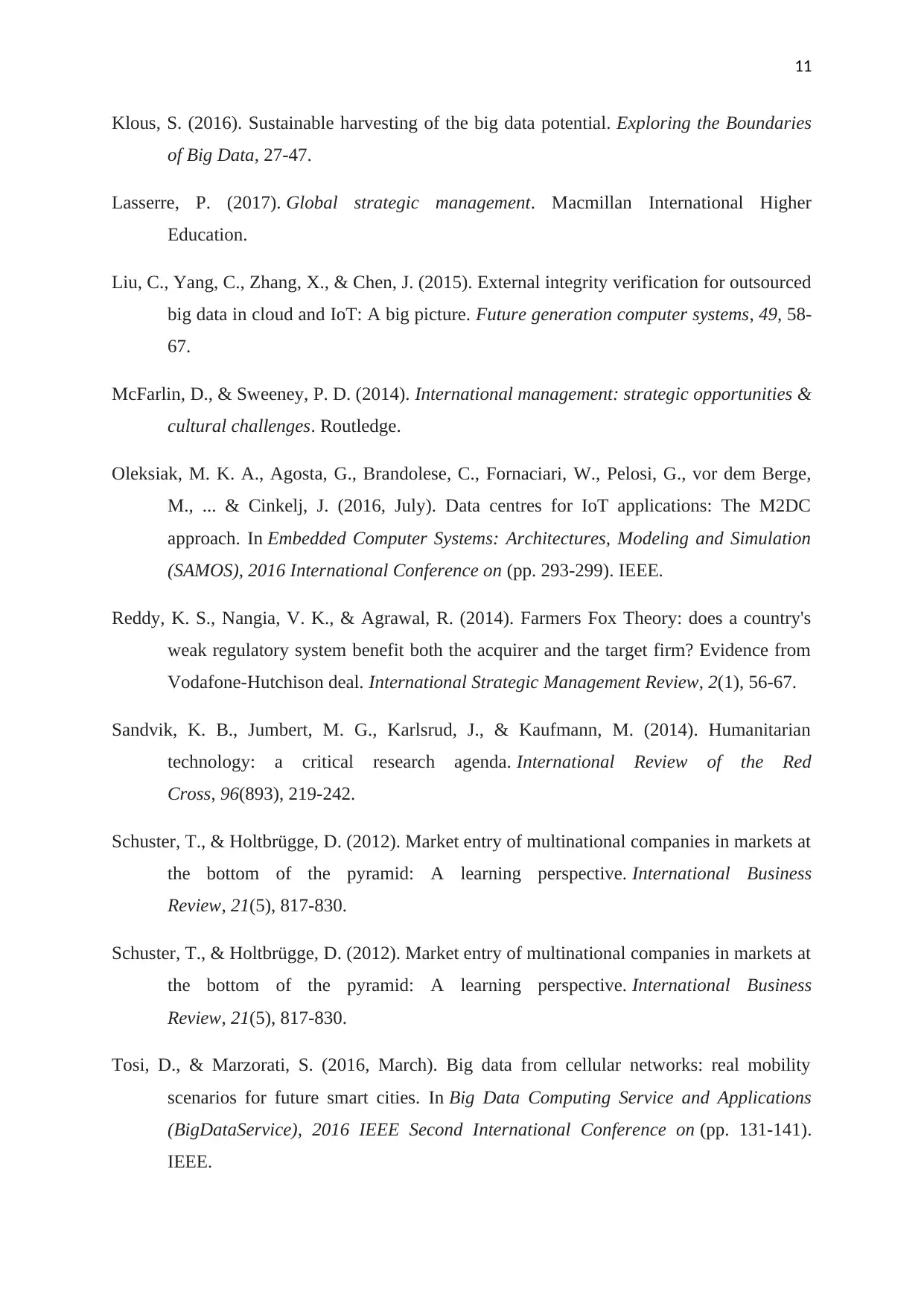
11
Klous, S. (2016). Sustainable harvesting of the big data potential. Exploring the Boundaries
of Big Data, 27-47.
Lasserre, P. (2017). Global strategic management. Macmillan International Higher
Education.
Liu, C., Yang, C., Zhang, X., & Chen, J. (2015). External integrity verification for outsourced
big data in cloud and IoT: A big picture. Future generation computer systems, 49, 58-
67.
McFarlin, D., & Sweeney, P. D. (2014). International management: strategic opportunities &
cultural challenges. Routledge.
Oleksiak, M. K. A., Agosta, G., Brandolese, C., Fornaciari, W., Pelosi, G., vor dem Berge,
M., ... & Cinkelj, J. (2016, July). Data centres for IoT applications: The M2DC
approach. In Embedded Computer Systems: Architectures, Modeling and Simulation
(SAMOS), 2016 International Conference on (pp. 293-299). IEEE.
Reddy, K. S., Nangia, V. K., & Agrawal, R. (2014). Farmers Fox Theory: does a country's
weak regulatory system benefit both the acquirer and the target firm? Evidence from
Vodafone-Hutchison deal. International Strategic Management Review, 2(1), 56-67.
Sandvik, K. B., Jumbert, M. G., Karlsrud, J., & Kaufmann, M. (2014). Humanitarian
technology: a critical research agenda. International Review of the Red
Cross, 96(893), 219-242.
Schuster, T., & Holtbrügge, D. (2012). Market entry of multinational companies in markets at
the bottom of the pyramid: A learning perspective. International Business
Review, 21(5), 817-830.
Schuster, T., & Holtbrügge, D. (2012). Market entry of multinational companies in markets at
the bottom of the pyramid: A learning perspective. International Business
Review, 21(5), 817-830.
Tosi, D., & Marzorati, S. (2016, March). Big data from cellular networks: real mobility
scenarios for future smart cities. In Big Data Computing Service and Applications
(BigDataService), 2016 IEEE Second International Conference on (pp. 131-141).
IEEE.
Klous, S. (2016). Sustainable harvesting of the big data potential. Exploring the Boundaries
of Big Data, 27-47.
Lasserre, P. (2017). Global strategic management. Macmillan International Higher
Education.
Liu, C., Yang, C., Zhang, X., & Chen, J. (2015). External integrity verification for outsourced
big data in cloud and IoT: A big picture. Future generation computer systems, 49, 58-
67.
McFarlin, D., & Sweeney, P. D. (2014). International management: strategic opportunities &
cultural challenges. Routledge.
Oleksiak, M. K. A., Agosta, G., Brandolese, C., Fornaciari, W., Pelosi, G., vor dem Berge,
M., ... & Cinkelj, J. (2016, July). Data centres for IoT applications: The M2DC
approach. In Embedded Computer Systems: Architectures, Modeling and Simulation
(SAMOS), 2016 International Conference on (pp. 293-299). IEEE.
Reddy, K. S., Nangia, V. K., & Agrawal, R. (2014). Farmers Fox Theory: does a country's
weak regulatory system benefit both the acquirer and the target firm? Evidence from
Vodafone-Hutchison deal. International Strategic Management Review, 2(1), 56-67.
Sandvik, K. B., Jumbert, M. G., Karlsrud, J., & Kaufmann, M. (2014). Humanitarian
technology: a critical research agenda. International Review of the Red
Cross, 96(893), 219-242.
Schuster, T., & Holtbrügge, D. (2012). Market entry of multinational companies in markets at
the bottom of the pyramid: A learning perspective. International Business
Review, 21(5), 817-830.
Schuster, T., & Holtbrügge, D. (2012). Market entry of multinational companies in markets at
the bottom of the pyramid: A learning perspective. International Business
Review, 21(5), 817-830.
Tosi, D., & Marzorati, S. (2016, March). Big data from cellular networks: real mobility
scenarios for future smart cities. In Big Data Computing Service and Applications
(BigDataService), 2016 IEEE Second International Conference on (pp. 131-141).
IEEE.
⊘ This is a preview!⊘
Do you want full access?
Subscribe today to unlock all pages.

Trusted by 1+ million students worldwide
1 out of 13
Related Documents
Your All-in-One AI-Powered Toolkit for Academic Success.
+13062052269
info@desklib.com
Available 24*7 on WhatsApp / Email
![[object Object]](/_next/static/media/star-bottom.7253800d.svg)
Unlock your academic potential
Copyright © 2020–2026 A2Z Services. All Rights Reserved. Developed and managed by ZUCOL.




